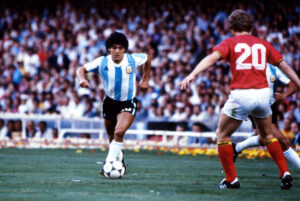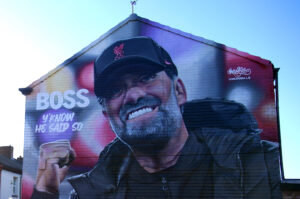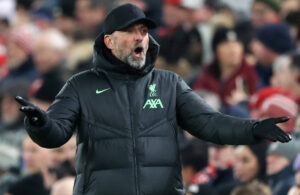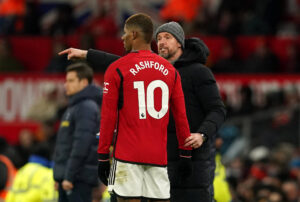Hertha Berlin and Tennis Borussia Berlin are the only two Berlin-based clubs to ever feature in more than a singular Bundesliga campaign. Tennis Borussia Berlin competed in two Bundesliga seasons during the 1970s, giving Berliners just four chances to experience a top-flight Stadt Derby. Both top-flight forays by Borussia ended in relegation. Since 1987, Hertha have been the only capital city side to compete in the Bundesliga. Importantly, those four Stadt Derbys were between two western-based clubs. A club from East Berlin has never gained promotion to the Bundesliga, meaning an east versus west showdown has never happened in Germany’s highest level. Berlin is the only capital city within Europe to have so few top-flight football clubs.
This Saturday, for the first time in the history of the Bundesliga, the eastern-based Union Berlin will play Hertha Berlin, and for the first time since the 1970s, there will be a top-flight Berlin derby. Such a match up is unique, be it Arsenal versus Tottenham Hotspur, Liverpool and Everton, or Borussia Dortmund against Schalke. Hertha versus Union contains cold war politics, decades of history, and the backdrop of a once divided city.
Hertha BSC v Union Berlin: Berlin’s First Top-Flight Derby in 30 Years
An Anti-Establishment Club
1. FC Union Berlin is, quite simply, a fascinating football club. As it is known today, the Köpenick club was founded in 1966, under the iron-fisted rule of the authoritarian Deutsche Demokratische Republik, the GDR. Until the reunification of Germany, Union found themselves bouncing up and down between East Germany’s first and second divisions. Success on the pitch is not what has made the club special, rather the community its fans built.
Köpenick is a working-class district of Berlin. Union and its ground, Stadion An der Alten Försterei, became a safe haven for dissidents of the East German regime and the all-controlling Sozialistische Einheitspartei Deutschlands, the SED. The club’s nickname is Eisern Union, Iron Union, to showcase just how strong the anti-authoritarian, anti-establishment commitment was and still is to this day. In 2004, Union raised funds for its license to compete in Germany’s fourth tier via blood donations from fans and, in 2009, thousands volunteered to help renovate the stadium to meet DFB legal requirements.
Eisern Union’s crowning achievement on the pitch before gaining promotion to the Bundesliga this past May was winning the East German cup in 1968. The club’s culture of political dissidence did not do it any favours in the ultra-corrupt Warsaw Pact nation, especially against its main rivals: Dynamo Berlin. Dynamo were founded by the Staatssicherheitsdienst, commonly known as the Stasi, the GDR’s infamously effective secret police.
The club won ten GDR top-flight titles in a row during the 1980s. Many fans who witnessed that dominance will tell you the referees were intimidated by the side’s Stasi backing. Penalties were given for fouls a metre outside of the 18-yard box, in addition to many other highly controversial refereeing decisions. Dynamo was universally hated throughout the GDR. In a beautiful case of poetic justice, Union has had the last laugh since reunification. The once Stasi-backed side are currently wallowing away in the Regionalliga Nordost, Germany’s fourth tier, while Union gained promotion to Bundesliga 2 in 2009, never looking back.
Football Clubs Have Struggled in West Berlin
Football in Berlin’s western half has been much different. Hertha Berlin, also known as the Alte Dame, the old lady, have been a stable Bundesliga side since the late 1990s. While Union were hampered due to its dissidence of the GDR regime, Hertha were not an attractive club to top talent throughout Europe as West Berlin was hidden far behind the Iron Curtain. The city was viewed as cold and uninviting. In the 1980s, the club fell from the Bundesliga to as far down as the Oberliga. Hertha’s exceptional youth academy was its ultimate saviour, with the second side even making it to the DFB Pokal final in 1993, only to lose to Bayer Leverkusen. The youth system has produced countless talents such as Nico Schultz, Nico Kovac, and most notably, Jerome and Kevin-Prince Boateng.
Since German reunification, supporters from the two clubs have held a Fan Freundschaft, a fan friendship. Just months after the fall of the Berlin Wall, Hertha and Union met for the first time in a friendly staged at West Berlin’s Olympiastadion. The friendly was much more than a simple football match. It was an event that brought the city together after decades of forced division. Both sets of fans sat together, celebrating goals from either side, creating a truly surreal experience in the world of football.
After gaining promotion in the late 1990s, Hertha began consistently finishing in the top third of the Bundesliga table, even claiming fourth in the 2008/09 campaign. Relegation in 2010 and 2012 put them in a tough spot, but both stints in Bundesliga 2 finished with the title in West Berlin. Importantly, it provided the first glimpse of a Stadt Derby between Hertha and Union. The first competitive encounter between the two in 2010 was an uninspiring 1-1 draw in Köpenick, but in a moment of heroic romance that many thought could only happen via a Hollywood script, Union beat Hertha in the return fixture by two goals to one at the Olympiastadion. The Fan Freundschaft was still on, but it was being put to the test every time the two clubs met as direct opponents of one another.
The Berlin Derby: Unlike Any Other
In the 2012/13 season, revenge was a dish best served cold, as Union were beaten 2-1 in their own backyard. The two clubs are now ready to face off once more, but this time in the Bundesliga. Union are in good form after a rough start to the campaign, coming off two victories in their last three, both against high flying SC Freiburg. The defeat in between was at the Allianz Arena, where Eisern Union lost a closely contested match to Bayern Munich by one goal while missing a penalty in the second half. Before claiming three points against Freiburg, Union had lost four straight after a famous victory at home over Borussia Dortmund.
Hertha began the season with just one point from four matches, but have performed exceptionally well since. Despite losing at home to Hoffenheim this past weekend, Covic’s men drew away at Bremen, Hertha’s bogey side for the last decade, after winning three straight. Earlier this week, Hertha won a dramatic but draining penalty shootout in the cup against Dynamo Dresden. This tiresome midweek fixture could play a part against Union on Saturday.
The stage is set for an epic match-up. Hertha believe that the Europa League is a possibility, sitting just four points off the top seven. Three points is a vital step, seeing that two of their next three opponents are RB Leipzig and Borussia Dortmund. On the other side of Berlin, Union have to start putting together some good results if they want to become only the third Berlin club to participate in more than just a singular Bundesliga campaign.
The East Berliners are 15th in the table with seven points, buy positions 17 through 14 have seven as well. Union need to begin separating themselves from the relegation pack, and to do that against Hertha would be nothing short of memorable. Two clubs, one battling for European football and the other against relegation, are going to play out a Berlin derby this Saturday that is quite unlike any other in world football.
Main Photo






